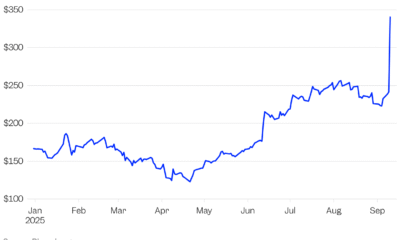AI Insights
4 Artificial Intelligence Stocks You Can Buy and Hold for the Next Decade

-
There are many great AI stocks to choose from, ranging from software companies to semiconductor manufacturers.
-
Spending for AI data infrastructure could reach an estimated $4 trillion by 2030.
-
Buying and holding stocks for the long term is one of the best ways to benefit from the market’s gains.
It’s no secret that artificial intelligence stocks have dominated the S&P 500‘s growth over the past few years. The booming sector has been spurred on by a race among the largest tech players as they spend hundreds of billions of dollars to stay ahead of rivals.
If you feel like you’re missing out on the AI boom or simply looking for a few ideas to expand your artificial intelligence portfolio, here are four AI stocks you can buy today and feel comfortable holding for the next decade.
Nvidia (NASDAQ: NVDA) is one of the leading AI semiconductor companies, with its processors in an estimated 70% to 95% of AI data centers. This strong position has led to impressive results for the company and resulted in its share price gaining over 1,100% over the past three years.
Nvidia‘s AI ride isn’t over yet, as the company’s latest Q2 results indicate. Data center sales spiked 56% to $41 billion as tech giants continue to invest in AI infrastructure. Profitability remains very high at the company, too, with non-GAAP earnings per share increasing 54% in Q2 to $1.05.
And more growth could be on the way. CEO Jensen Huang says AI data center spending could reach $3 trillion to $4 trillion by the end of the decade, which would be a boon to Nvidia’s top and bottom lines.
Microsoft (NASDAQ: MSFT) was an early adopter of AI chatbots and partnered with OpenAI years ago. That wise positioning gave Microsoft the ability to integrate the bot into its suite of online services and help it outpace rivals, including Apple.
But Microsoft’s real long-term AI opportunities may come from its cloud computing platform, Azure. Microsoft is the second-largest cloud company after Amazon and has 20% of the market. Azure and other cloud sales growth spiked 39% in Q4 (which ended June 30), and Azure sales for fiscal 2025 reached $75 billion — a 34% jump from the previous year.
Microsoft’s strong position in AI cloud computing services will become increasingly important in the coming years as global AI cloud revenue will grow into an estimated $2 trillion market by 2030.
Taiwan Semiconductor Manufacturing (NYSE: TSM), also called TSMC, may not be on your AI investing radar as much as some of the other companies on this list, but it should be. The company is the go-to manufacturer for most AI processors and holds an estimated 90% of the advanced processor market.
AI Insights
General Counsel’s Job Changing as More Companies Adopt AI

The general counsel’s role is evolving to include more conversations around policy and business direction, as more companies deploy artificial intelligence, panelists at a University of California Berkeley conference said Thursday.
“We are not just lawyers anymore. We are driving a lot of the policy conversations, the business conversations, because of the geopolitical issues going on and because of the regulatory, or lack thereof, framework for products and services,” said Lauren Lennon, general counsel at Scale AI, a company that uses data to train AI systems.
Scattered regulation and fraying international alliances are also redefining the general counsel’s job, panelists …
AI Insights
California bill regulating companion chatbots advances to Senate

The California State Assembly approved legislation Tuesday that would place new safeguards on artificial intelligence-powered chatbots to better protect children and other vulnerable users.
Introduced in July by state Sen. Steve Padilla, Senate Bill 243 requires companies that operate chatbots marketed as “companions” to avoid exposing minors to sexual content, regularly remind users that they are speaking to an AI and not a person, as well as disclose that chatbots may not be appropriate for minors.
The bill passed the Assembly with bipartisan support and now heads to California’s Senate for a final vote.
“As we strive for innovation, we cannot forget our responsibility to protect the most vulnerable among us,” Padilla said in statement. “Safety must be at the heart of all developments around this rapidly changing technology. Big Tech has proven time and again, they cannot be trusted to police themselves.”
The push for regulation comes as tragic instances of minors harmed by chatbot interactions have made national headlines. Last year, Adam Raine, a teenager in California, died by suicide after allegedly being encouraged by OpenAI’s chatbot, ChatGPT. In Florida, 14-year-old Sewell Setzer formed an emotional relationship with a chatbot on the platform Character.ai before taking his own life.
A March study by the MIT Media Lab examining the relationship between AI chatbots and loneliness found that higher daily usage correlated with increased loneliness, dependence and “problematic” use, a term that researchers used to characterize addiction to using chatbots. The study revealed that companion chatbots can be more addictive than social media, due to their ability to figure out what users want to hear and provide that feedback.
Setzer’s mother, Megan Garcia, and Raine’s parents have filed separate lawsuits against Character.ai and OpenAI, alleging that the chatbots’ addictive and reward-based features did nothing to intervene when both teens expressed thoughts of self-harm.
The California legislation also mandates companies program AI chatbots to respond to signs of suicidal thoughts or self-harm, including directing users to crisis hotlines, and requires annual reporting on how the bots affect users’ mental health. The bill allows families to pursue legal action against companies that fail to comply.
AI Insights
AI a 'Game Changer' for Assistance, Q&As in NJ Classrooms – GovTech
-

 Business2 weeks ago
Business2 weeks agoThe Guardian view on Trump and the Fed: independence is no substitute for accountability | Editorial
-
Tools & Platforms1 month ago
Building Trust in Military AI Starts with Opening the Black Box – War on the Rocks
-

 Ethics & Policy2 months ago
Ethics & Policy2 months agoSDAIA Supports Saudi Arabia’s Leadership in Shaping Global AI Ethics, Policy, and Research – وكالة الأنباء السعودية
-

 Events & Conferences4 months ago
Events & Conferences4 months agoJourney to 1000 models: Scaling Instagram’s recommendation system
-

 Jobs & Careers2 months ago
Jobs & Careers2 months agoMumbai-based Perplexity Alternative Has 60k+ Users Without Funding
-

 Podcasts & Talks2 months ago
Podcasts & Talks2 months agoHappy 4th of July! 🎆 Made with Veo 3 in Gemini
-

 Education2 months ago
Education2 months agoVEX Robotics launches AI-powered classroom robotics system
-

 Education2 months ago
Education2 months agoMacron says UK and France have duty to tackle illegal migration ‘with humanity, solidarity and firmness’ – UK politics live | Politics
-

 Funding & Business2 months ago
Funding & Business2 months agoKayak and Expedia race to build AI travel agents that turn social posts into itineraries
-

 Podcasts & Talks2 months ago
Podcasts & Talks2 months agoOpenAI 🤝 @teamganassi






















